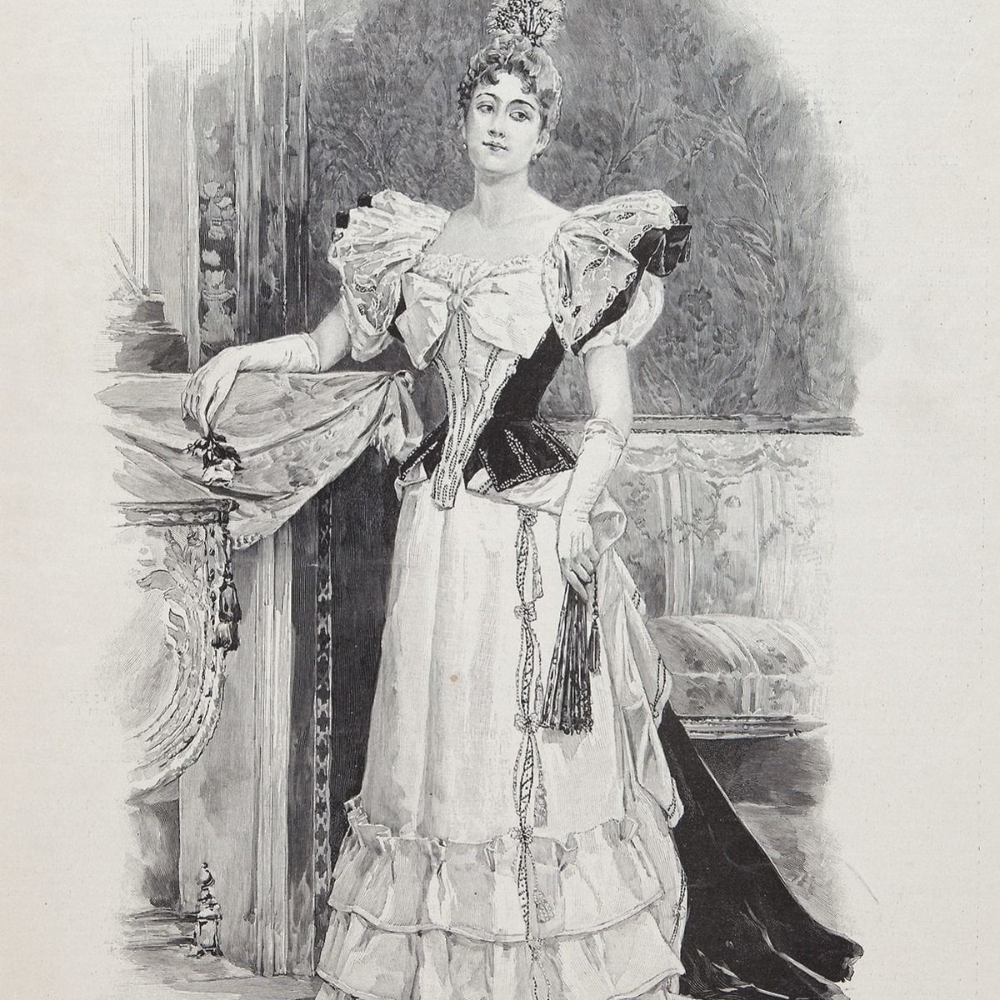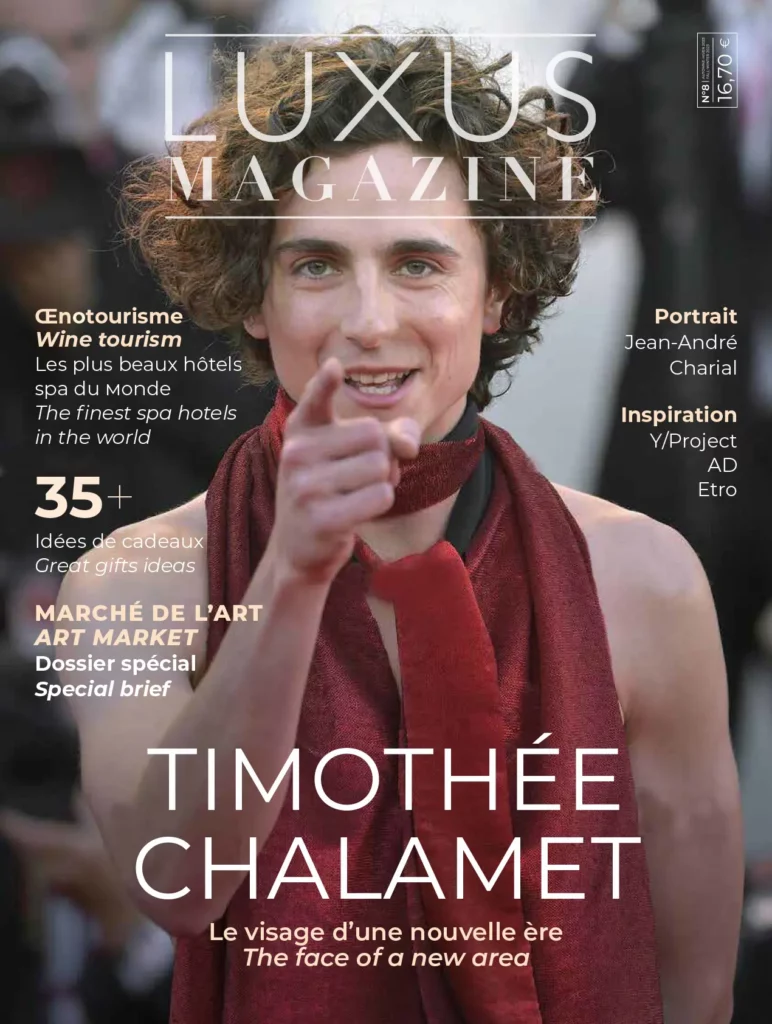A short history of luxury: Charles Frederick Worth, founding father of Parisian haute-couture

Charles Frederick Worth, a great French couturier of British origin in the 19th century, is known for having founded in 1858 the first fashion house, the House of Worth. A look back at the history of the founding father of Parisian haute-couture.
Charles Frederick Worth was born on October 13, 1825, into a modest family in England, living in the town of Bourne. He took his first steps into the world of fashion as an apprentice to two London textile merchants, and this experience allowed him to acquire a lot of knowledge about the world of couture.
The young man discovered a passion for the world of fashion during his visits to the National Gallery, where he developed a fascination for portraits of royalty, and particularly for the majestic gowns of another era, worn by the women of the upper-middle class. These antique fabrics gave birth to the first sketches of what would shape Charles Frederick Worth‘s revolutionary aesthetic, and of this in-between, between avant-garde and forward-looking vision of the art of sewing and an aesthetic borrowed from the past.

In 1845, at the age of 20, Charles Frederick Worth moved to Paris and landed a job with Gagelin, a major textile, and ready-to-wear company. At first a simple salesman, Worth climbed the company’s ladder thanks to his efficiency and seriousness, until he was assigned the management of the couture division. This was his first step into professional sewing, a position that allowed him to express his creativity in the service of his art.
His creations within the Gagelin company did not go unnoticed and very quickly, the Parisian high society snatched his creations. His work was exhibited in 1851 at the London World’s Fair, then in Paris in 1855. These exhibitions were rewarded with prizes which contributed to forging the reputation of the Gagelin company, but also that of Worth himself. This growing success allowed him to open the first couture house in history in 1858, with an associate, Otto Bobergh, and which was located at 7 rue de la Paix.

Charles Frederick Worth was considered a visionary, a preceptor of future trends, he has a conception of creation that is unique to him at the time: he does not make models on request of customers as was the case for other designers, but his creations are the result of his genius and his personal inspiration. Thus was born the first fashion house in history, the house of Worth.
His wife, Marie Vernet, wore her husband’s creations and turned heads all over the capital, becoming the first professional model in history, a revolution in fashion communication. Charles Frederick Worth could freely express his passion and decided to present his collections during fashion shows, shaping the fashion cycle by adapting the pieces presented to the seasons (fall/winter and spring/summer). The designer imposes his vision of fashion to his customers coming from all over Europe and seduces even the highest social spheres.

Charles Frederick Worth‘s success came during the Second Empire, under Napoleon III. The emperor wanted the imperial capital that Paris had become to reflect the wealth of the country to all the neighboring countries. Luxury and fashion had a place not seen since the French Revolution, and Worth’s noble vision of fashion was favored by Napoleon III‘s wife, Eugenie de Montijo, who influenced the entire court to purchase the great couturier’s latest creations. Empress Eugenie was won over by Worth’s work and spent many hours in his store imagining her future outfits.
In the 1860s, Charles Frederick Worth‘s success was at its peak. The designer was the first to export his pieces abroad, exhibiting his designs in the great boutiques of London and even New York. The genius of Worth‘s creations even reached the ears of the very famous Elisabeth of Wittelsbach, also known as Sissi the Empress. For the Empress of Austria and Queen of Hungary, Charles Frederick Worth made a unique piece: the “Robe aux Étoiles” (Dress with Stars), which she wore to a ball in 1864. “Elizabeth was dazzlingly beautiful […]. I have never seen anyone produce such an effect. She wore a white dress embroidered with stars and wore her famous diamond stars in her hair, and a bouquet of camellias at her throat“, said the Archduke Louis-Victor.

When the Belle Epoque took hold in Paris, the creations of the great couturier Charles Frederick Worth continued to be talked about. They attracted the attention of Princess Pauline de Metternich, wife of the Austrian ambassador, who ran a literary salon in Paris that was very popular with high society. The Countess de Greffulhe, who served as a model for Marcel Proust’s character of the Duchess of Guermantes in In Search of Lost Time, and who had a close relationship with the Russian imperial family, was also conquered by the art of the house of Worth. The dancer and spy Mata Hari was also seen wearing a Charles Frederick Worth creation.
The great couturier died on March 10, 1895, and bequeathed the Worth house to his two sons, Gaston-Lucien and Jean-Philippe. His creations, however, still live on and will forever remain an inexhaustible source of inspiration for all haute-couture enthusiasts. His avant-garde and innovative vision of couture and its codes still influence designers around the world. Most of his dresses are now kept in great museums and art galleries around the world, as historical pieces and works of art.
Read also > A BRIEF HISTORY OF LUXURY: THE ASSASSINATION OF MAURIZIO GUCCI
Featured photo: © Public domain [/vc_column_text][/vc_column][/vc_row]
[EN] CLAIRE DOMERGUE, A SPECIALIST IN COMMUNICATION IN THE LUXURY SECTOR, HAS SURROUNDED HERSELF WITH EXPERTS TO CREATE THE FIRST MEDIA DEDICATED TO THE ECONOMIC NEWS OF LUXURY AND FASHION. THE LATTER DRAWS THE ATTENTION OF ITS READERS TO ALL THE MAJOR PLAYERS IN THESE SECTORS WHO SHARE THEIR EXPERIENCES, VISIONS AND KNOW-HOW. MORE THAN A SPECIALIZED WEBZINE, LUXUS PLUS IS A MULTI-SECTOR INFORMATION SYSTEM, WHICH HAS BECOME THE REFERENCE MONITORING TOOL FOR LUXURY AND FASHION PROFESSIONALS. OUR NEWSLETTERS CONTRIBUTE TO MAKE OUR READERS AWARE OF THE CHANGES AFFECTING THE LUXURY INDUSTRIES. THANKS TO AN INCREASED WATCH AND AN EXCELLENT KNOWLEDGE OF THE SECTOR, WE ARE INTERESTED IN THE MAIN ECONOMIC AND TECHNOLOGICAL STAKES OF FASHION, FINE WATCHMAKING, JEWELRY, GASTRONOMY, COSMETICS, PERFUMES, HOTELS, PRESTIGIOUS REAL ESTATE...********[FR] Claire Domergue, spécialiste de la communication dans le secteur du luxe, s’est entourée d’experts pour créer le premier média consacré à l’actualité économique du Luxe et de la mode. Ce dernier attire tout particulièrement l’attention de ses lecteurs sur l’ensemble des acteurs majeurs de ces secteurs qui y partagent leurs expériences, visions et savoir-faire. Plus qu’un webzine spécialisé, Luxus Plus est un système d’information multi-sectoriel, devenu l’outil de veille de référence pour les professionnels du luxe et de la mode. Nos newsletters de veille contribuent en effet à sensibiliser nos lecteurs aux mutations qui touchent les industries du luxe. Grâce à une veille accrue et à une excellente connaissance du secteur, nous nous intéressons aux principaux enjeux économiques et technologiques de la mode, la haute horlogerie, la joaillerie, la gastronomie, des cosmétiques, parfums, de l’hôtellerie, l’immobilier de prestige…






